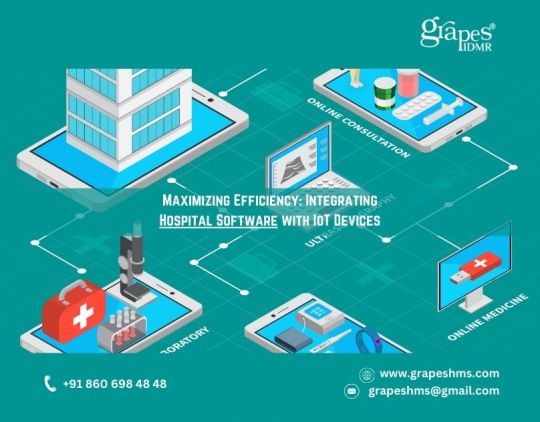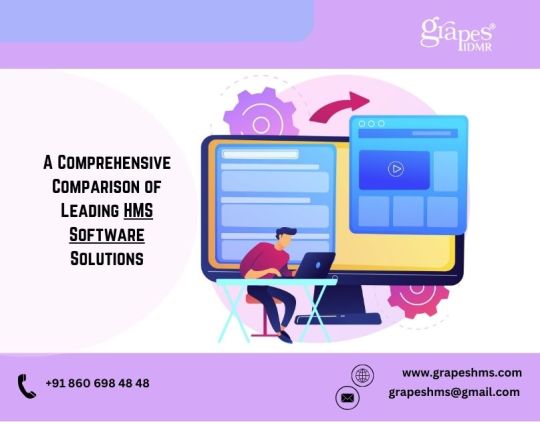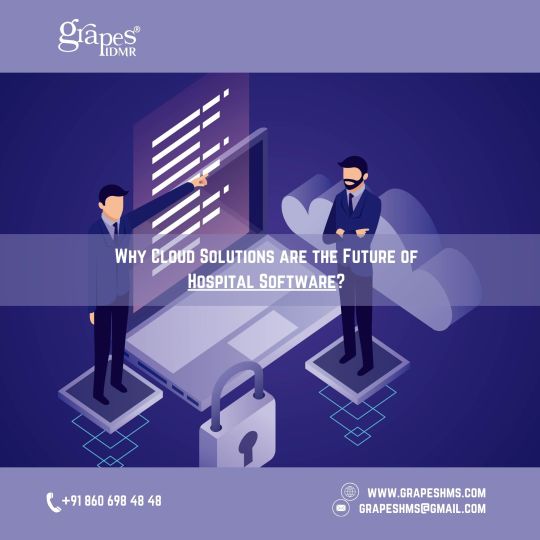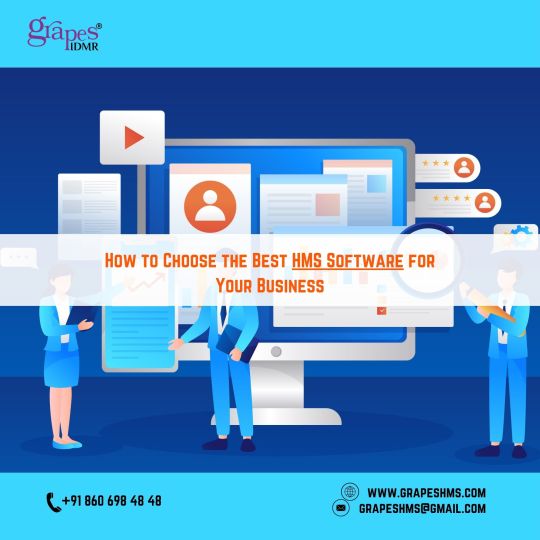#LabManagement
Explore tagged Tumblr posts
Text
Boost Hospital Efficiency with Grapes IDMR – A Smarter Way to Manage Healthcare
Managing a healthcare facility is no small feat. With multiple departments, continuous patient flow, and high-stakes decisions, hospitals need a reliable solution to keep everything running smoothly. Enter Grapes IDMR – a smart hospital management software developed by Grapes Innovative Solutions to simplify and strengthen hospital operations.
This all-in-one digital platform is designed to support hospitals in managing everything from patient records and doctor scheduling to lab diagnostics and pharmacy workflows. With Grapes IDMR, administrative burdens shrink, data becomes more accessible, and departments work in harmony. What makes this software especially valuable is its comprehensive nature. It doesn't just focus on one area it connects all the moving parts of a hospital, ensuring your team can collaborate effectively and provide timely care to every patient.
Here’s how Grapes IDMR brings value:
Centralized control over inpatient and outpatient data
Automated billing, discharge summaries, and appointment tracking
Secure, cloud-enabled electronic health records (EHR)
Custom modules for pharmacy, lab, HR, and inventory
Real-time dashboards for operational insights
Whether you’re upgrading from outdated tools or going digital for the first time, Grapes IDMR adapts to your hospital’s specific needs. It’s not just software it’s a long-term partner in your hospital’s growth journey. Backed by the expertise of Grapes Innovative Solutions, this hospital management software has already empowered numerous hospitals to improve service quality, streamline processes, and increase transparency in administration.
Visit for more: Grapes innovative solutions
#HospitalManagementSoftware#GrapesIDMR#HealthTech#MedicalIT#DigitalHospital#EHRSoftware#PatientRecords#HospitalAutomation#InpatientManagement#OutpatientManagement#HealthcareSoftware#ClinicalEfficiency#HospitalAdminTools#PharmacyIntegration#LabManagement#SmartHealthcare#MedicalSolutions#OPManagement#IPManagement#HospitalWorkflow#PaperlessHealthcare#SecureHealthRecords#GrapesInnovativeSolutions#HealthcareSystemSoftware#HospitalSolutions
0 notes
Text
Delayed Lab Results? Check the Timeline Instantly with Grapes BSA Pro!
In the fast-paced world of healthcare, delays in lab results can slow down diagnosis and treatment, impacting patient care. But what if you could track the exact journey of every lab test in real-time? With Grapes BSA PRO’s Lab Result Timeline feature, hospitals can now experience a transparent, streamlined, and efficient process for managing lab reports.

What is the Lab Result Timeline Feature?
The Lab Result Timeline in Grapes BSA PRO is a revolutionary tool designed to eliminate the common frustrations of delayed lab results. This feature allows doctors and nurses to track a test’s journey — from the moment it is recommended to its final approval. No more confusion, no more delays, just clear, real-time data at your fingertips.
youtube
How Does the Lab Result Timeline Work?
When you open a patient’s lab result, a timeline icon is visible at the top-right of the result section. By tapping on this icon, you unlock a detailed step-by-step timeline, including:
Test Recommendation – When the doctor orders the lab test.
Bill Generation – Time when the test is billed to the patient.
Sample Collection – When the sample is taken from the patient.
Sample Received at Lab – The exact time the sample reaches the laboratory.
Result Generation – The moment the lab test results are ready.
Verification & Confirmation – The lab's internal verification process.
Investigation Completion – The final approval of the lab result.
This timeline gives unparalleled visibility into each stage of the lab testing process, ensuring no step is overlooked.
Why is the Lab Result Timeline Important?
In hospitals, time is critical. When lab results are delayed, it can create confusion, disrupt patient care, and slow down clinical decision-making. The Lab Result Timeline feature in Grapes BSA PRO provides:
Clear Accountability: If a test result is delayed, the timeline helps pinpoint where the issue lies – collection, lab processing, or approval.
Improved Efficiency: Doctors and nurses no longer need to manually track lab reports, reducing unnecessary follow-ups and waiting time.
Better Patient Care: Faster access to lab results means quicker diagnoses and timely treatment.
Enhanced Hospital Workflow: Hospitals can streamline operations by identifying and resolving bottlenecks in lab result processing.
With this feature, every second saved can contribute to better healthcare outcomes.
How to Access the Lab Result Timeline?
Using the Lab Result Timeline feature in Grapes BSA PRO is simple and user-friendly. Follow these steps:
Go to the Patient Dashboard – Navigate to the Lab Result Menu.
Select a Lab Result – Tap on any test result to view details.
Click the Timeline Icon – This unlocks the complete step-by-step timeline of the test.
With just a few taps, healthcare professionals can access valuable insights that enhance clinical decision-making and hospital efficiency.
Why Choose Grapes BSA PRO?
Grapes BSA PRO is designed with hospital efficiency in mind. This intelligent bedside assistant brings real-time tracking, automation, and seamless integration into healthcare workflows. Here’s why hospitals trust Grapes BSA PRO:
AI-Powered Insights – Enhances decision-making with data-driven solutions.
Voice-to-Text Assistance – Reduces documentation workload for healthcare professionals.
Graphical Reports – Offers easy visualization of patient data.
Personalized Alerts – Keeps medical teams updated in real-time.
Integration with Grapes IDMR – A complete hospital management system for seamless data exchange.
A Small Icon with a Big Impact
A simple timeline icon in Grapes BSA PRO is transforming how hospitals manage lab results. With this feature, hospitals can reduce wait times, improve workflow efficiency, and provide better patient care.
Want to see the Lab Result Timeline feature in action? Watch our full video demonstration and discover how this smart solution is revolutionizing hospital operations!
Stay Updated with Smart Healthcare Solutions
If you found this information valuable, make sure to like, share, and subscribe to our channel for more updates on smart healthcare innovations and enterprise solutions. Stay ahead in healthcare technology with Grapes BSA PRO!
👉 Experience the power of Grapes BSA PRO today! 📞 Call us at 7510330000 🌐 Visit : Best Hospital Management Software - to schedule a free demo now!
#HospitalManagementSoftware#HealthcareTechnology#LabResults#ClinicalEfficiency#DoctorTools#PatientCare#GrapesBSAPRO#MedicalInnovation#HealthTech#MedicalSoftware#HealthcareIT#LabReportTracking#SmartHospitals#AIinHealthcare#EHR#GrapesIDMR#ElectronicMedicalRecords#NursingTools#SmartHealthcare#MedicalDiagnostics#LabManagement#TimelyDiagnosis#AutomationInHealthcare#HealthcareInnovation#BetterPatientCare#FasterLabResults#Youtube
0 notes
Text
Maximizing Efficiency: Integrating Hospital Software with IoT Devices

In today's rapidly evolving healthcare landscape, the integration of hospital software with Internet of Things (IoT) devices is revolutionizing patient care delivery, operational efficiency, and overall healthcare outcomes. By harnessing the power of IoT technology, healthcare organizations can maximize efficiency, streamline workflows, and enhance patient experiences. Let's explore the benefits and implications of integrating hospital software with IoT devices.
Real-Time Patient Monitoring:
Hospital software integrated with IoT devices enables real-time monitoring of patient vital signs, activities, and health metrics.
IoT sensors embedded in medical devices, wearables, and patient monitoring systems capture data continuously and transmit it directly to the hospital software platform.
Healthcare providers gain instant access to critical patient information, allowing for timely interventions, proactive care management, and improved clinical outcomes.
Enhanced Asset Management:
IoT-enabled hospital software facilitates the tracking and management of medical equipment, supplies, and assets within healthcare facilities.
RFID tags, sensors, and beacons embedded in equipment and inventory items enable automated asset tracking, location monitoring, and inventory management.
Healthcare organizations can optimize asset utilization, reduce equipment downtime, and minimize inventory stockouts by leveraging real-time data insights provided by IoT-integrated hospital software.
Improved Facility Operations:
Hospital software integrated with IoT devices streamlines facility operations and maintenance processes, leading to increased efficiency and cost savings.
IoT sensors deployed throughout healthcare facilities monitor environmental conditions, energy usage, and equipment performance in real-time.
Facility managers can proactively identify maintenance issues, optimize energy consumption, and ensure regulatory compliance by leveraging data-driven insights from IoT-enabled hospital software.
Remote Patient Care and Telemedicine:
IoT-integrated hospital software enables remote patient monitoring and telemedicine consultations, expanding access to healthcare services and improving patient engagement.
IoT-enabled wearable devices, home monitoring kits, and telehealth platforms facilitate virtual consultations, remote diagnostics, and medication adherence monitoring.
Healthcare providers can deliver personalized care plans, monitor patients' progress remotely, and intervene as needed, resulting in better health outcomes and reduced hospital readmissions.
Predictive Analytics and Preventive Care:
Hospital software integrated with IoT devices leverages data analytics and machine learning algorithms to predict and prevent adverse events and medical complications.
IoT sensors capture and analyze vast amounts of patient data, including physiological parameters, lifestyle factors, and environmental triggers.
Healthcare organizations can identify patterns, trends, and risk factors early on, enabling proactive interventions, personalized treatment plans, and preventive care strategies to improve patient health and wellness.
In conclusion, integrating hospital software with IoT devices offers tremendous potential for maximizing efficiency, improving patient care, and transforming healthcare delivery. By harnessing real-time data insights from IoT-enabled devices, healthcare organizations can enhance clinical workflows, optimize resource utilization, and deliver more personalized and proactive care to patients. Embracing IoT integration in hospital software is not just a technological advancement but a strategic imperative for driving innovation and achieving excellence in today's dynamic healthcare environment.
#HMS#hmssoftware#hospitalsoftware#HealthcareManagementsystem#Healthcare#HospitalManagementSystem#HospitalManagement#BSA#GrapesHMS#MIS#EMR#GrapesIDMR#Grapes#HealthcareManagementSystemsoftware#Software#SoftwareSolution#Doctor#PatientRegistration#IPDManagement#OPDManagement#IDMR#Labmanagement#NursingStation#Dietmanagement#MRDManagement#BloodBank#Linenmanagement#HRManagement#Pharmacy#Radiology
0 notes
Text
A Comprehensive Comparison of Leading HMS Software Solutions

Choosing the best hospital management software (HMS software) for your healthcare organization is a crucial decision that requires careful evaluation of various factors. To assist you in this process, we have conducted a comprehensive comparison of leading HMS software solutions, highlighting their key features, functionalities, and benefits.
Epic Systems Corporation
Features: Epic offers a comprehensive suite of HMS software solutions, including electronic health records (EHR), patient scheduling, billing, and clinical decision support.
Functionality: Epic's software is highly customizable and scalable, catering to the needs of small clinics and large healthcare systems.
Benefits: Epic's HMS software is renowned for its interoperability, enabling seamless integration with other healthcare systems and facilitating collaborative care delivery.
Cerner Corporation:
Features: Cerner's HMS Software encompasses EHR, revenue cycle management, population health management, and telehealth capabilities.
Functionality: Cerner's software is known for its robust clinical decision support tools, data analytics capabilities, and patient engagement solutions.
Benefits: Cerner's HMS Software streamlines workflows, improves clinical outcomes, and enhances patient satisfaction through personalized care delivery and proactive population health management.
Allscripts Healthcare Solutions:
Features: Allscripts offers an integrated suite of HMS software solutions, including EHR, practice management, revenue cycle management, and patient engagement tools.
Functionality: Allscripts' software prioritizes interoperability, enabling seamless data exchange between disparate systems and enhancing care coordination across healthcare settings.
Benefits: Allscripts' HMS Software empowers healthcare organizations to deliver high-quality, patient-centered care, improve operational efficiency, and achieve better clinical and financial outcomes.
Meditech:
Features: Meditech provides a comprehensive suite of HMS software solutions, including EHR, patient registration, scheduling, billing, and clinical decision support.
Functionality: Meditech's software is designed to streamline clinical workflows, enhance patient safety, and optimize revenue cycle management through integrated, user-friendly interfaces.
Benefits: Meditech's HMS Software offers scalability, flexibility, and interoperability, enabling healthcare organizations to adapt to changing needs, improve care coordination, and achieve meaningful use of health IT.
NextGen Healthcare:
Features: NextGen offers a suite of HMS software solutions, including EHR, practice management, revenue cycle management, and population health management.
Functionality: NextGen's software prioritizes usability, interoperability, and data analytics, empowering healthcare organizations to drive better clinical and financial outcomes.
Benefits: NextGen's HMS Software enables healthcare organizations to optimize workflows, improve care quality, and enhance patient engagement through personalized, data-driven care delivery.
In conclusion, each of these leading HMS software solutions offers unique features, functionalities, and benefits to meet the diverse needs of healthcare organizations. When choosing the best HMS software for your business, consider factors such as interoperability, scalability, usability, and alignment with your organization's strategic objectives. By conducting a comprehensive comparison and selecting the HMS software solution that best fits your organization's needs, you can drive innovation, improve patient care, and achieve success in today's dynamic healthcare landscape.
#HMS#hmssoftware#hospitalsoftware#HealthcareManagementsystem#Healthcare#HospitalManagementSystem#HospitalManagement#BSA#GrapesHMS#MIS#EMR#GrapesIDMR#Grapes#HealthcareManagementSystemsoftware#Software#SoftwareSolution#Doctor#PatientRegistration#IPDManagement#OPDManagement#IDMR#Labmanagement#NursingStation#Dietmanagement#MRDManagement#BloodBank#Linenmanagement#HRManagement#Pharmacy#Radiology
0 notes
Text
Comparing Pathology Lab Software Options in Patna!
Choose the best pathology lab software in Patna! Compare features, prices, and user reviews to streamline your diagnostics. Find your perfect fit here!
0 notes
Text
What is the purpose of the lab management module in the hospital?
The primary purpose of the lab management module in the hospital's Best Healthcare Management System is to effectively oversee and optimize the operations within the laboratory. This module serves several critical purposes:
Efficient Workflow Management: It aims to streamline and automate various laboratory processes, reducing manual errors, and enhancing the overall efficiency of the lab. This includes managing sample processing, tracking, and result reporting.
Improved Accuracy and Quality: The module ensures standardized procedures and protocols to minimize errors, leading to more accurate test results and maintaining high-quality standards in laboratory testing.
Resource Optimization: It helps manage and optimize laboratory resources, such as inventory, equipment, and staff, leading to better resource utilization, reduced wastage, and improved productivity.
Regulatory Compliance: Ensuring adherence to regulatory standards and quality control measures is a fundamental purpose. The system assists in meeting healthcare regulations and compliance requirements.
Integration and Data Sharing: The module aims to integrate seamlessly with other hospital management systems, facilitating easy data sharing and enabling collaboration and communication among various departments within the healthcare system.
Enhanced Patient Care: The ultimate purpose is to improve patient care by providing timely and accurate test results, enabling healthcare professionals to make informed decisions and deliver better care to patients.
Data Analysis and Reporting: Generating comprehensive reports and utilizing data analytics to identify trends and areas for improvement is a core purpose. This assists in strategic decision-making and optimizing operational efficiency.
Security and Confidentiality: Safeguarding sensitive patient data is a critical purpose, ensuring the system is equipped with robust security measures to maintain confidentiality and comply with data protection regulations.
Adaptability and Scalability: The module is designed to be adaptable and scalable, serving the purpose of meeting the evolving needs of the hospital and allowing for system growth and adjustments as necessary.
Continuous Improvement: Supporting a culture of continuous improvement is a key purpose, focusing on identifying areas for enhancement in laboratory processes, technology, and overall healthcare service delivery.
In essence, the lab management module within the Best Healthcare Management System serves multiple purposes, all aimed at ensuring efficient, accurate, and high-quality laboratory operations, ultimately contributing to superior patient care and the overall success of the healthcare institution.
#HMS#HealthcareManagementsystem#Healthcare#HospitalManagementSystem#HospitalManagement#BSA#GrapesHMS#MIS#EMR#GrapesIDMR#Grapes#HealthcareManagementSystemsoftware#Software#SoftwareSolution#Doctor#PatientRegistration#IPDManagement#OPDManagement#IDMR#Labmanagement#NursingStation#Dietmanagement#MRDManagement#BloodBank#Linenmanagement#HRManagement#Pharmacy#Radiology
0 notes
Text

The all-in-one solution for healthcare professionals. Manage appointments, labs, EMR & more. 24/7 support. . . . Get a free demo today!
☎️+91 9633 447 508 🌎www.doctorlive.co
#HealthcareSolutions#DoctorLive#OPDManagement#LabManagement#EMR#PharmacyManagement#Reports#Customizable#PatientCare
0 notes
Text
"Future Insights into Cloud ELN Services (2024-2033)"
Cloud Electronic Lab Notebook (ELN) services are revolutionizing the way scientific research is conducted by providing a secure, collaborative, and efficient platform for data management and documentation. These cloud-based solutions allow researchers to store, share, and analyze experimental data in real time, facilitating seamless collaboration across geographical boundaries. With features like version control, audit trails, and integration with laboratory instruments, Cloud ELN services enhance data integrity and reproducibility. As the demand for efficient and transparent research practices grows, Cloud ELN services are becoming essential tools in both academia and industry.
#CloudELN #ElectronicLabNotebook #ScientificResearch #DataManagement #ResearchCollaboration #RealTimeData #CloudBasedSolutions #LabData #VersionControl #AuditTrails #LabInstruments #DataIntegrity #Reproducibility #EfficientResearch #TransparentResearch #ResearchInnovation #ScientificData #LabManagement #CollaborativeResearch #TechInScience
0 notes
Text

Robust CSV Support for QC Lab Systems Ensure the integrity and compliance of your QC lab systems with our robust CSV support. Our consultants offer expertise in validating various software systems critical for QC operations. Here's what we can provide:
● Validation of Laboratory Information Management Systems (LIMS) such as BM RAM/Biovia LIMS (eLogbook) for efficient data management and compliance with regulatory requirements, including 21 CFR Part 11 assessment ● Thorough validation of ServiceNow Ticketing System for effective incident management and traceability of quality-related events ● Validation of NC-200, MacsQuant & Quant Studio, Atlas Maximo (IBM) for data integrity and compliance with regulatory standards ● Expert validation of Malvern Morphology and Mettler Toledo Balances for accurate characterization and measurement of pharmaceutical materials ● Validation of Microscopes, pH Meters, and Balances for reliable analytical measurements and compliance with ALCOA principles
🌐 Website: www.compleatts.com 📧 Email: [email protected] 📞 Phone: +1 (704) 453-8093
CSVSupport #QCLab #Compliance #LIMSValidation #ServiceNow #DataIntegrity #LabValidation #PharmaLab #LabEfficiency #RegulatoryCompliance #21CFRPart11 #QualityControl #LabConsulting #PharmaceuticalValidation #LabEquipment #ALCOA #LabManagement #QCOperations #LabConsultants #AnalyticalInstruments
0 notes
Text

#LIMS can improve customer service by providing faster turnaround times, better data accuracy, and more efficient communication with customers. . Tenwave Infotech provides best Healthcare software Book a Free Demo Today!
#DidYouKnow#facts#LIMSsoftware#labmanagement#limssoftware#lab#reducewaiting#ERP#tenwaveinfotech#HealthcareIT#EnterpriseSolutions#hospitals#PatientCare#SaaS#LIMS
0 notes
Text
Why Cloud Solutions are the Future of Hospital Software

In today's rapidly evolving healthcare landscape, the adoption of cloud-based solutions is reshaping the way hospital software is deployed, managed, and utilized. Cloud solutions offer numerous advantages over traditional on-premises software, making them the future of hospital software. Let's explore why cloud solutions are leading the way in revolutionizing hospital software and driving innovation in the healthcare industry.
Enhanced Accessibility and Flexibility: Cloud-based hospital software provides healthcare organizations with unparalleled accessibility and flexibility. Unlike traditional on-premises solutions, which are limited to specific physical locations or devices, cloud solutions can be accessed from anywhere with an internet connection. This enables healthcare professionals to access patient information, collaborate with colleagues, and perform critical tasks from the hospital, clinic, or even remotely, improving workflow efficiency and responsiveness to patient needs.
Scalability and Agility: Cloud solutions offer unmatched scalability and agility, allowing healthcare organizations to scale their software infrastructure up or down based on changing needs and demands. Whether expanding services, adding new users, or integrating with additional systems, cloud-based hospital software can adapt quickly and seamlessly to accommodate growth and evolution. This scalability enables healthcare organizations to stay agile, responsive, and competitive in a dynamic healthcare environment without the constraints of traditional hardware limitations.
Cost-Effectiveness and Efficiency: Cloud solutions offer significant cost savings and operational efficiencies compared to traditional on-premises software deployments. With cloud-based hospital software, healthcare organizations can avoid hefty upfront investments in hardware infrastructure, software licenses, and IT personnel required for on-premises deployments. Instead, they can benefit from a pay-as-you-go subscription model, where they only pay for the resources and services they use, eliminating unnecessary expenses and reducing total cost of ownership over time.
Improved Security and Compliance: Contrary to common misconceptions, cloud solutions offer robust security measures and compliance capabilities that meet or exceed those of traditional on-premises deployments. Leading cloud providers invest heavily in state-of-the-art security technologies, data encryption, access controls, and compliance certifications to protect sensitive patient information and ensure regulatory compliance. By leveraging the expertise and resources of cloud providers, healthcare organizations can enhance data security, reduce risk, and maintain compliance with industry regulations such as HIPAA and GDPR.
Seamless Updates and Maintenance: Cloud-based hospital software eliminates the burden of manual updates, patches, and maintenance tasks typically associated with on-premises deployments. Cloud providers handle software updates and maintenance automatically, ensuring that healthcare organizations always have access to the latest features, enhancements, and security patches without disrupting operations. This seamless update process minimizes downtime, enhances system reliability, and enables healthcare organizations to focus on delivering quality patient care rather than managing IT infrastructure.
In conclusion, cloud solutions are the future of hospital software, offering unparalleled accessibility, scalability, cost-effectiveness, security, and efficiency compared to traditional on-premises deployments. By embracing cloud-based hospital software, healthcare organizations can unlock new opportunities for innovation, collaboration, and growth while enhancing patient care delivery and driving operational excellence in the digital age. Embracing cloud solutions is not just a technological upgrade but a strategic imperative for healthcare organizations looking to thrive in an increasingly interconnected and data-driven healthcare landscape.
#HMS#hmssoftware#hospitalsoftware#HealthcareManagementsystem#Healthcare#HospitalManagementSystem#HospitalManagement#BSA#GrapesHMS#MIS#EMR#GrapesIDMR#Grapes#HealthcareManagementSystemsoftware#Software#SoftwareSolution#Doctor#PatientRegistration#IPDManagement#OPDManagement#IDMR#Labmanagement#NursingStation#Dietmanagement#MRDManagement#BloodBank#Linenmanagement#HRManagement#Pharmacy#Radiology
0 notes
Text
How to Choose the Best HMS Software for Your Business

Selecting the right hospital management software (HMS software) is a critical decision for healthcare organizations, as it directly impacts patient care, operational efficiency, and overall success. With numerous options available on the market, choosing the best HMS software can be a daunting task. Here are some key factors to consider when evaluating and selecting the best HMS software for your business:
Define your requirements: Before exploring HMS software options, it's essential to clearly define your organization's requirements, goals, and priorities. Consider factors such as the size of your organization, specialty areas, workflow complexities, regulatory compliance needs, and integration requirements with existing systems. Identifying specific features and functionalities that are essential for your business will help narrow down your options and ensure that the chosen HMS software aligns with your organization's objectives.
Assess Ease of Use and User Experience: The best HMS software should be intuitive, user-friendly, and easy to navigate for healthcare professionals and staff members. Look for software solutions that offer a modern interface, customizable dashboards, and workflow automation features that streamline tasks and reduce manual effort. Consider conducting demos or trials of potential HMS software solutions to evaluate the user experience firsthand and assess how well the software aligns with your organization's workflow and user preferences.
Evaluate integration capabilities: Integration with existing systems and technologies is crucial for seamless data exchange, interoperability, and workflow continuity. Evaluate the integration capabilities of HMS software solutions and ensure compatibility with your organization's electronic health records (EHR) systems, laboratory information systems (LIS), billing platforms, and other third-party applications. Choose HMS software that supports industry-standard protocols such as HL7 and FHIR and offers flexible integration options to meet your organization's unique needs.
Consider scalability and flexibility. As your organization grows and evolves, your HMS software should be able to scale and adapt to changing needs and requirements. Assess the scalability and flexibility of potential HMS software solutions to accommodate future expansion, additional users, and new functionalities. Look for software vendors that offer modular solutions, customizable features, and flexible licensing options that can be tailored to your organization's size and growth trajectory.
Prioritize data security and compliance: Data security and regulatory compliance are paramount in healthcare, and HMS software must adhere to stringent standards to protect patient information and ensure compliance with regulations such as HIPAA, GDPR, and HITECH. Evaluate the security measures and compliance features of HMS Software solutions, including data encryption, access controls, audit trails, and regular security updates. Choose HMS software vendors with a proven track record of prioritizing data security and compliance in their software development and implementation processes.
Assess vendor reputation and support: Selecting a reputable HMS software vendor with a track record of success and a strong commitment to customer support is essential for a successful implementation and long-term partnership. Research vendor credentials, customer reviews, and case studies to gauge their reputation and reliability. Additionally, inquire about the level of customer support, training resources, and ongoing maintenance and support services offered by the vendor to ensure that your organization receives the necessary assistance and guidance throughout the implementation process and beyond.
In conclusion, choosing the best HMS software for your business requires careful consideration of your organization's requirements, user experience, integration capabilities, scalability, data security, vendor reputation, and support services. By assessing these key factors and conducting thorough research and evaluation, you can select an HMS software solution that aligns with your organization's objectives, enhances patient care delivery, and drives operational efficiency in the rapidly evolving healthcare landscape.
#HMS#hmssoftware#hospitalsoftware#HealthcareManagementsystem#Healthcare#HospitalManagementSystem#HospitalManagement#BSA#GrapesHMS#MIS#EMR#GrapesIDMR#Grapes#HealthcareManagementSystemsoftware#Software#SoftwareSolution#Doctor#PatientRegistration#IPDManagement#OPDManagement#IDMR#Labmanagement#NursingStation#Dietmanagement#MRDManagement#BloodBank#Linenmanagement#HRManagement#Pharmacy#Radiology
0 notes
Text
Our selection of laboratory accessories includes top brands like Eppendorf, Sartorius, and Fisher Scientific, ensuring that you're getting the highest quality products available. We also offer competitive pricing and fast shipping to make your shopping experience as seamless as possible. At LabAccessory.com, we are committed to providing our customers with exceptional service and support. Whether you're just starting your lab or looking to upgrade your existing equipment, our knowledgeable team is here to help you find the right products for your specific needs. For more details visit the site https://www.labaccessory.com/
#LabEfficiencyEnhancement#PremiumLabAccessories#LabAccessories#LabSupplies#LabEquipment#LaboratoryEfficiency#QualityLabAccessories#LabProductivity#LabManagement#LabOrganization#LabSafety#LabInnovation#LabTechnology#LabAdvancement#LabExcellence#LabPerformance#LabOptimization#LabSolutions#LabProfessionalism#LabAccuracy#LabPrecision#LabReliability#LabConvenience#LabCostEfficiency#LabSustainability
0 notes
Text
What are the goals of the lab management module in the hospital?
The lab management module within the Best Healthcare Management System is designed with several specific goals aimed at optimizing the operations and outcomes of the hospital's laboratory:
Enhanced Efficiency: The primary goal is to streamline and automate laboratory processes to improve efficiency. This includes optimizing workflow, reducing manual errors, and expediting the delivery of accurate test results.
Improved Quality and Accuracy: Ensuring that the laboratory conducts tests accurately and consistently is a key objective. Standardizing procedures and minimizing human error through automation supports this goal.
Effective Resource Management: Managing laboratory resources, such as inventory, equipment, and staff, efficiently is essential. The system aims to reduce waste, optimize inventory levels, and effectively allocate resources for improved productivity.
Compliance and Regulatory Adherence: Ensuring compliance with regulatory standards and quality control measures is a significant goal. The system helps the laboratory meet stringent healthcare regulations and maintain high-quality testing standards.
Integration and Collaboration: Facilitating seamless integration with other hospital management modules is a core goal. This enables easy data sharing, enhancing collaboration and communication among various departments within the healthcare system.
Enhanced Patient Care: The ultimate goal is to improve patient care by providing timely, accurate, and reliable test results. The system aims to support healthcare professionals in making informed decisions for better patient outcomes.
Data Analysis and Reporting: Generating comprehensive reports and utilizing data analytics to identify trends, areas for improvement, and strategic decision-making is another goal. This assists in optimizing operations and resource allocation.
Security and Confidentiality: Protecting sensitive patient data is a fundamental goal. The system is designed with robust security measures to ensure confidentiality and compliance with data protection regulations.
Adaptability and Scalability: The system is built to be adaptable and scalable, aiming to meet the evolving needs of the hospital. This goal ensures that the system can grow and adjust to changing requirements over time.
Continuous Improvement: Promoting a culture of ongoing improvement is crucial. The system aims to identify opportunities for enhancement in laboratory processes, technology, and overall healthcare service delivery.
In summary, the lab management module within the Best Healthcare Management System aims to achieve these goals collectively, focusing on efficiency, accuracy, compliance, patient care, and continuous improvement in the hospital's laboratory operations.
#HMS#HealthcareManagementsystem#Healthcare#HospitalManagementSystem#HospitalManagement#BSA#GrapesHMS#MIS#EMR#GrapesIDMR#Grapes#HealthcareManagementSystemsoftware#Software#SoftwareSolution#Doctor#PatientRegistration#IPDManagement#OPDManagement#IDMR#Labmanagement#NursingStation#Dietmanagement#MRDManagement#BloodBank#Linenmanagement#HRManagement#Pharmacy#Radiology
0 notes
Photo

Not minding the unmarked waste in the fume hood because it’s so seasonal looking ❄️☃️ #sciencelab #teachinglab #mountvernonohio #mountvernonoh #thevern #knoxcountyohio #schoolscience #lablife #downtown #chemlab #labmanagement #wintervibes #wintervibes❄️ #❄️ (at COTC Central Ohio Technical College) https://www.instagram.com/p/CXMUKlpurs5/?utm_medium=tumblr
#sciencelab#teachinglab#mountvernonohio#mountvernonoh#thevern#knoxcountyohio#schoolscience#lablife#downtown#chemlab#labmanagement#wintervibes#wintervibes❄️#❄️
0 notes
Text

The all-in-one solution for healthcare professionals. Manage appointments, labs, EMR & more. 24/7 support. . . . Get a free demo today!
☎️+91 9633 447 508 🌎www.doctorlive.co
#HealthcareSolutions#DoctorLive#OPDManagement#LabManagement#EMR#PharmacyManagement#Reports#Customizable#PatientCare
0 notes